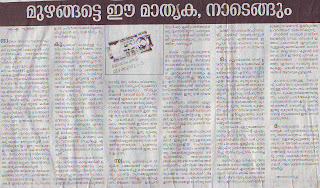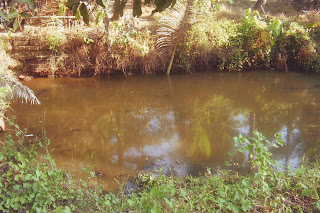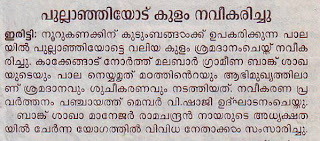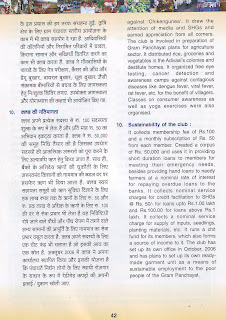The Kakkeyangad Experiment
>> Friday, February 18, 2011
Freeing the poor from the clutches of usurious money lenders
The backdrop
Muzhakkunnu Panchayath, situated in the eastern tract of Kannur district of Kerala, is mostly inhabited by settlers from Travancore who are known for their hard work. The uncertainties in the agriculture sector in the late nineties induced by the fall in prices of major commodities like pepper, arecanut and rubber, which are the major cash crops grown in the area, drove the farmers of this district to a piquant situation. This adverse situation had a telling effect on banks as well. Plagued by low recoveries, banks were in a dilemma and recycling of credit became a problem for them.
The beginning
It was at this time that the Branch Manager of Kakkengad branch of North Malabar Gramin Bank under the guidance of then DDM took the initiative to mobilise a few progressive farmers who under the leadership of Shri A.M.Mathew joined hands on 19 March 1996 to give birth to Kakkengad Farmers Club. Undertaking a host of farmer friendly initiatives over the years, the Club grew from strength to strength and has now become a force to reckon with. This Club which won the prestigious best performance award from NABARD for three consecutive years viz, 2004-05, 2005-06 and 2006-2007 and recognition for the Best Farmers' Club at the National level in the year 2007-2008 is now a decade and half old and has many feathers to its cap.
The SHPI role
Taking a cue from the novel idea of forming SHGs for empowering poor women to mitigate their hardships, the Club, in 1997, took the initiative to form SHGs of women folk. What started as an experiment in 1997, has now become a movement of its own waking up the dormant potential of the weaker and so far neglected segment of the society. Formation and nurturing of SHGs is one of the add on activities undertaken by the Club besides its core functions and it has traversed a long journey in this sphere leaving behind many memorable impressions.
The strength of SHGs
Now the Club has 188 SHGs under its fold out of which 15 are exclusive men’s groups. The total membership of the SHGs has swelled to more than 3300 which covers around 80 percent of the population of the Panchayath. 109 out of the 188 SHGs are credit linked with Kakkyangad brach of North Malabar Gramin Bank. The bank has so far extended loans to the tune of Rs.175.88 lakh to these SHGs. The striking aspect of the movement is that the recovery at the bank level and SHG level has been cent per cent throughout. The Branch Manager who was struggling to recover bad loans in the past is now a happy person with the SHGs and Club members extending a helping hand in educating the borrowers to effectively and judiciously use credit and recycle it through prompt repayment.
The sustainability factor
To ensure the sustainability of the SHGs promoted by it, the Club took the initiative to form a democratically elected Coordination Committee at Panchayath level to oversee the affairs of the SHGs and for providing an umbrella support to them. Six to seven SHGs from the same locality elect one member who will represent them in the Coordination Committee. The SHG movement has taken strong roots in the Panchayath and most of the families have come out of the clutches of the moneylenders, thanks to the active role played by the SHGs.
The revelation
One of the major impacts of the SHG movement in our country is the fact that the poor are able to come out of the clutches of the usurious moneylenders who are known to charge exhorbitant rates of interest. However, there were a few members within the SHGs promoted by the Club who still continued to be indebted to the private moneylenders which in local parlance is called as “Blade”. The group corpus was too meagre to provide individual credit to members to repay huge debts taken by them for purposes like marriage, hospitalisation etc. The quantum of credit assistance available from the bank to the SHGs was not adequate as well since it was linked to their savings. Besides, there were many families who were not covered by the SHG movement who were sailing in the same boat. This revelation came to light in the brain storming sessions organised as a part of the training programmes arranged for the Leaders of the SHGs promoted by the Club by the present DDM of NABARD. The discussions culminated in the DDM suggesting to the SHG leaders to take the lead in helping their helpless brothers and sisters from the clutches of moneylenders as a priority item.
The strategy
Taking a cue from the suggestions of the DDM, the leaders of the Farmers Club and the Coordination Committee worked out a strategy to help those who were still indebted to private money lenders. The DDM discussed the matter with the Chairman and top executives of North Malabar Gramin Bank. It was a matter of coincidence that the bank at that time was toying with the idea of implementing a pilot project for freeing one village from the clutches of usurious money lenders. Rightly, NMGB decided to select its Kakkengad branch as the first destination for the pilot project. The fact that this branch had a committed Farmers Club and a good network of SHGs under it gave courage to the bank to select this branch for this unique credit intervention. The bank decided to carry out a detailed survey of each of the households in the panchayath with the help of Farmers Club and the SHGs promoted by it to assess the extent of indebtedness.
The house to house survey
The DDM gave a helping hand to NMGB to design the questionnaire for the benchmark survey through which it was thought fit to collect all information relating to the socio economic parameters of each family including the extent of indebtedness if any. With the Farmers Club taking the lead in carrying out the benchmark survey of all households in the Panchayath with the help of SHGs promoted by it and ably assisted by the Coordination Committee, things moved swiftly. The survey was completed in all the 14 wards of the Panchayath and the ultimate analysis revealed that around 500 families in the entire Panchayath were still indebted to moneylenders! The reasons for the indebtedness were primarily for meeting medical expenses, marriage expenses, redemption of debts etc.
The timely credit support
The bank after carrying out a case by case scrutiny and discussions with DDM and Farmers Club decided to help these families with liberal credit facilities. Credit camps were organised by the bank in each of the wards of the Panchayath wherein the elected representatives also participated. The indebted people were briefed about the plan of the bank for providing credit support to them to repay the debts taken from private moneylenders. This was done to ensure transparency in the entire process. In a phased manner the bank completed the process of extending credit to the indebted poor. An aggregate amount of Rs.87 lakh was disbursed to 487 eligible beneficiaries. The striking feature was that the bank did not design a separate loan product for the purpose, but accommodated the indebted people under its existing loan products.
The feeling of comradere
The same people who were at the mercy of money lenders earlier came together to help their brethren wriggle out of their clutches, thanks to the small thought shared by the DDM which helped the SHG members to take it to its logical conclusion with the active support and guidance from the Farmers Club and the Bank. The bank is confident that the watchful eyes of the Farmers Club and the Coordination Committee would ensure the end use of credit and prompt repayment and it has been proved correct. The wealth of data collected by the SHG members through the survey would now help the bank to design customised business plans for each household.
The recognition
In the words of Mr. Hameed, a casual worker in a way side hotel and father of three daughters, the help provided by NMGB not only helped him repay the loan which he took long ago to marry off his third daughter but also saved him from taking the last recourse ie, suicide, by which act he would have bequeathed debt to his three married daughters. The people of Mozhakunnu Panchayath now feel that their journey towards sustenance has just begun. Rightly, Kakkengad Farmers Club was honoured the Best Farmers Club Award of NABARD at national level for this unique intervention.
A high level team of experts from Regional Training College, NABARD, Mangalore visited Kakkengad to study the impact of this unique intervention by the Farmers' Club and the findings of the study were commented upon by the expert team set up by Government of India to study the problems of farmers in agriculture credit headed by Sri. U C Sarangi, Chairman, NABARD.
The Kakkengad Experiment
The backdrop
Muzhakkunnu Panchayath, situated in the eastern tract of Kannur district of Kerala, is mostly inhabited by settlers from Travancore who are known for their hard work. The uncertainties in the agriculture sector in the late nineties induced by the fall in prices of major commodities like pepper, arecanut and rubber, which are the major cash crops grown in the area, drove the farmers of this district to a piquant situation. This adverse situation had a telling effect on banks as well. Plagued by low recoveries, banks were in a dilemma and recycling of credit became a problem for them.
The beginning
It was at this time that the Branch Manager of Kakkengad branch of North Malabar Gramin Bank under the guidance of then DDM took the initiative to mobilise a few progressive farmers who under the leadership of Shri A.M.Mathew joined hands on 19 March 1996 to give birth to Kakkengad Farmers Club. Undertaking a host of farmer friendly initiatives over the years, the Club grew from strength to strength and has now become a force to reckon with. This Club which won the prestigious best performance award from NABARD for three consecutive years viz, 2004-05, 2005-06 and 2006-2007 and recognition for the Best Farmers' Club at the National level in the year 2007-2008 is now a decade and half old and has many feathers to its cap.
The SHPI role
Taking a cue from the novel idea of forming SHGs for empowering poor women to mitigate their hardships, the Club, in 1997, took the initiative to form SHGs of women folk. What started as an experiment in 1997, has now become a movement of its own waking up the dormant potential of the weaker and so far neglected segment of the society. Formation and nurturing of SHGs is one of the add on activities undertaken by the Club besides its core functions and it has traversed a long journey in this sphere leaving behind many memorable impressions.
Now the Club has 188 SHGs under its fold out of which 15 are exclusive men’s groups. The total membership of the SHGs has swelled to more than 3300 which covers around 80 percent of the population of the Panchayath. 109 out of the 188 SHGs are credit linked with Kakkyangad brach of North Malabar Gramin Bank. The bank has so far extended loans to the tune of Rs.175.88 lakh to these SHGs. The striking aspect of the movement is that the recovery at the bank level and SHG level has been cent per cent throughout. The Branch Manager who was struggling to recover bad loans in the past is now a happy person with the SHGs and Club members extending a helping hand in educating the borrowers to effectively and judiciously use credit and recycle it through prompt repayment.
The sustainability factor
To ensure the sustainability of the SHGs promoted by it, the Club took the initiative to form a democratically elected Coordination Committee at Panchayath level to oversee the affairs of the SHGs and for providing an umbrella support to them. Six to seven SHGs from the same locality elect one member who will represent them in the Coordination Committee. The SHG movement has taken strong roots in the Panchayath and most of the families have come out of the clutches of the moneylenders, thanks to the active role played by the SHGs.
The revelation
One of the major impacts of the SHG movement in our country is the fact that the poor are able to come out of the clutches of the usurious moneylenders who are known to charge exhorbitant rates of interest. However, there were a few members within the SHGs promoted by the Club who still continued to be indebted to the private moneylenders which in local parlance is called as “Blade”. The group corpus was too meagre to provide individual credit to members to repay huge debts taken by them for purposes like marriage, hospitalisation etc. The quantum of credit assistance available from the bank to the SHGs was not adequate as well since it was linked to their savings. Besides, there were many families who were not covered by the SHG movement who were sailing in the same boat. This revelation came to light in the brain storming sessions organised as a part of the training programmes arranged for the Leaders of the SHGs promoted by the Club by the present DDM of NABARD. The discussions culminated in the DDM suggesting to the SHG leaders to take the lead in helping their helpless brothers and sisters from the clutches of moneylenders as a priority item.
The strategy
Taking a cue from the suggestions of the DDM, the leaders of the Farmers Club and the Coordination Committee worked out a strategy to help those who were still indebted to private money lenders. The DDM discussed the matter with the Chairman and top executives of North Malabar Gramin Bank. It was a matter of coincidence that the bank at that time was toying with the idea of implementing a pilot project for freeing one village from the clutches of usurious money lenders. Rightly, NMGB decided to select its Kakkengad branch as the first destination for the pilot project. The fact that this branch had a committed Farmers Club and a good network of SHGs under it gave courage to the bank to select this branch for this unique credit intervention. The bank decided to carry out a detailed survey of each of the households in the panchayath with the help of Farmers Club and the SHGs promoted by it to assess the extent of indebtedness.
The house to house survey
The DDM gave a helping hand to NMGB to design the questionnaire for the benchmark survey through which it was thought fit to collect all information relating to the socio economic parameters of each family including the extent of indebtedness if any. With the Farmers Club taking the lead in carrying out the benchmark survey of all households in the Panchayath with the help of SHGs promoted by it and ably assisted by the Coordination Committee, things moved swiftly. The survey was completed in all the 14 wards of the Panchayath and the ultimate analysis revealed that around 500 families in the entire Panchayath were still indebted to moneylenders! The reasons for the indebtedness were primarily for meeting medical expenses, marriage expenses, redemption of debts etc.
The timely credit support
The bank after carrying out a case by case scrutiny and discussions with DDM and Farmers Club decided to help these families with liberal credit facilities. Credit camps were organised by the bank in each of the wards of the Panchayath wherein the elected representatives also participated. The indebted people were briefed about the plan of the bank for providing credit support to them to repay the debts taken from private moneylenders. This was done to ensure transparency in the entire process. In a phased manner the bank completed the process of extending credit to the indebted poor. An aggregate amount of Rs.87 lakh was disbursed to 487 eligible beneficiaries. The striking feature was that the bank did not design a separate loan product for the purpose, but accommodated the indebted people under its existing loan products.
The feeling of comradere
The same people who were at the mercy of money lenders earlier came together to help their brethren wriggle out of their clutches, thanks to the small thought shared by the DDM which helped the SHG members to take it to its logical conclusion with the active support and guidance from the Farmers Club and the Bank. The bank is confident that the watchful eyes of the Farmers Club and the Coordination Committee would ensure the end use of credit and prompt repayment and it has been proved correct. The wealth of data collected by the SHG members through the survey would now help the bank to design customised business plans for each household.
The recognition
In the words of Mr. Hameed, a casual worker in a way side hotel and father of three daughters, the help provided by NMGB not only helped him repay the loan which he took long ago to marry off his third daughter but also saved him from taking the last recourse ie, suicide, by which act he would have bequeathed debt to his three married daughters. The people of Mozhakunnu Panchayath now feel that their journey towards sustenance has just begun. Rightly, Kakkengad Farmers Club was honoured the Best Farmers Club Award of NABARD at national level for this unique intervention.
A high level team of experts from Regional Training College, NABARD, Mangalore visited Kakkengad to study the impact of this unique intervention by the Farmers' Club and the findings of the study were commented upon by the expert team set up by Government of India to study the problems of farmers in agriculture credit headed by Sri. U C Sarangi, Chairman, NABARD.
(Article compiled by Mr. P A Premkumar, AGM, Nabard, Kannur)









































